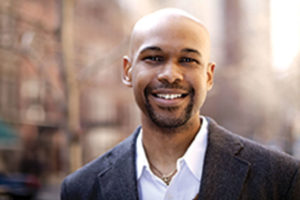By Dakota Antelman, Contributing Writer

Photo/Rubin Nizri
Grafton – Rev. Daniel Gregoire of the Unitarian Universalist Society of Grafton and Upton (UUSGU) has posed tough questions to his congregation in this recent era of social unrest and conciseness.
“Do we know Black and Brown people?”
“Are we connecting with Black and Brown people?”
“Are we present in their lives?”
A Black man himself, Gregoire has found himself offering a unique perspective on race and social justice in suburban America. Proud of that identity, he’s made issues of voice, visibility and even silent contemplation central parts of his leadership through troubled proverbial waters.
“We want to react; we want to do something,” he said of such silence in particular. “We experience pain and we want the pain to go away. But in the early days of a tragedy it’s hard to know what to do.”
“There’s a time and a season for everything and there will be a time to act,” he added. “But there’s also a time to reflect. That’s a space we don’t spend enough time in.”
Previously working in New York and Philadelphia, Gregoire accepted his new job as a minister at UUSGU in 2016. He moved to town the same day a gunman killed 50 people at an LGBTQ nightclub in Orlando, Fla.
Starting his tenure here in the shadow of one of the worst acts of anti-LGBTQ violence in US history, Gregoire has involved activism in his leadership, organizing vigils and protests at various moments over the past four years.
Now, though, he reiterates that he is encouraging his congregation members to reflect on their lives and practice mindfulness in planning effective ways to respond to recent acts of racism.
Similar in appearance, he says, this kind of silence is different than the inaction many advocates decry.
“It’s about the intent behind the silence,” he said. “Is this a generative kind of silence? Are you acquiring the resources you need to later engage, or are you just retreating into yourself as a way of disengaging?”
All this has landed on eager ears within Gregoire’s congregation.
Jackie Davison, a retired schoolteacher, was born in Grafton and has seen her community spend decades grappling with the same issues Gregoire now notes.
She says she was raised “without a racist bone in [her] body” and recalls a prominent Black family in town that she was close to in the 1960s. That family did not face violence or more traditionally overt racism in town, Davison recalls. Nonetheless, they moved away in hopes of raising their children in a more diverse community.
Years later, Davison says that she was similarly struck by the fact that Gregoire wanted to come to town in the first place.
“Why would a handsome young Black man want to come to Grafton?” she remembers thinking to herself.
Thought it wasn’t as diverse as other communities, Grafton was attractive for Gregoire. An enthusiast for old New England architecture, he was charmed by Grafton’s history, vibrance, and bucolic nature.
The town has work to do in promoting diversity within it, Gregoire and Davison agree. But it, indeed, remains rich in culture and full of potential to continue to grow. That growth, in fact, is already happening.
“He’s helped me really become aware of my white privilege and he’s encouraged us to take action and make our voices heard,” Davison said of Gregoire. “…I might otherwise just sit quietly. But Daniel doesn’t have any of that.”
As he works with his community to find the best ways to reaffirm the values of diversity and compassion they hold as pillars of their faith, Gregoire insists that change can come in small towns.
In Grafton, he says, that can only happen with increased visibility and more thoughtful reflection.
“If this awakening doesn’t then lead to the action of diversifying our lives and desegregating our lives, I don’t see it doing much,” he said. “At the micro level, we have to figure out how to have more people in our lives who are not exactly the same as we are.”

















